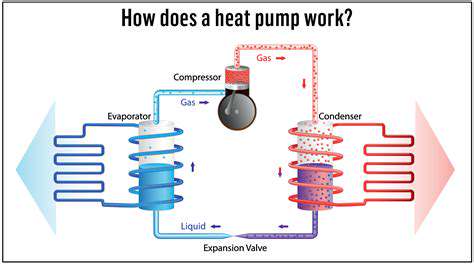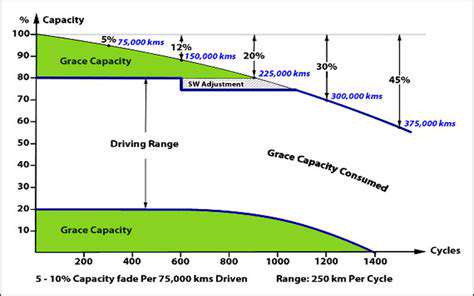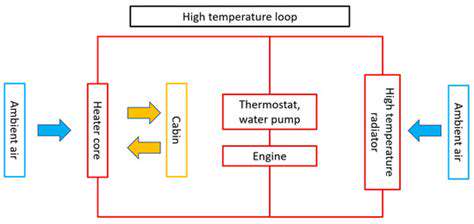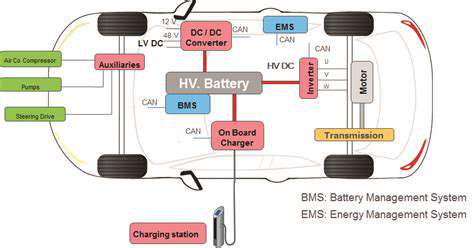Heat Pump Technology in Electric Vehicles Explained
How Heat Pump Technology Works in EVs
Components of a Heat Pump System
Electric vehicle heat pumps are sophisticated systems that use electricity to move heat rather than burning fuel, offering a more efficient and environmentally friendly way to heat and cool interiors. A key component is the compressor, which is driven by an electric motor. This compressor compresses a refrigerant, increasing its temperature and pressure. The refrigerant then flows through a condenser, releasing heat into the surrounding air or cabin.
Another crucial component is the expansion valve. This valve regulates the refrigerant flow, ensuring the proper temperature and pressure levels throughout the system. The evaporator absorbs heat from the outside air (or cabin) and transfers it to the refrigerant, which then returns to the compressor to repeat the cycle. This entire process is controlled by sophisticated electronics, monitoring various parameters to maintain optimal cabin temperature.
The Role of Refrigerant
The refrigerant used in electric vehicle heat pumps is carefully chosen for its thermodynamic properties, enabling efficient heat transfer. These refrigerants are designed to absorb and release heat at specific temperatures, ensuring the heat pump can effectively heat or cool the cabin. The choice of refrigerant is a critical factor in determining the overall performance of the heat pump system, impacting its efficiency and environmental impact.
Different refrigerants have varying global warming potentials (GWP), with some being far more environmentally friendly than others. Modern heat pump systems increasingly incorporate refrigerants with lower GWP values, aligning with sustainability goals. This careful consideration of refrigerant selection plays a vital role in reducing the overall environmental footprint of EVs.
Efficiency Advantages over Traditional Systems
Heat pump technology offers significant advantages in terms of efficiency compared to traditional resistive heating and cooling systems. By moving heat rather than generating it directly, heat pumps can achieve a higher heating and cooling output for the same amount of electrical input. This translates to improved fuel economy and a reduced reliance on energy sources that might otherwise contribute to higher CO2 emissions.
This efficiency is particularly pronounced in colder climates, where resistive heating systems require substantial energy input to achieve desired cabin temperatures. Heat pumps effectively utilize waste heat from the vehicle's operation to enhance heating efficiency. This contributes to lower operating costs and less strain on the vehicle's overall energy consumption.
Impact on Electric Vehicle Performance
Integrating a heat pump system does impact the overall performance of an electric vehicle. The electrical power required to operate the compressor and other components contributes to the total energy consumption, which might translate to slightly reduced electric range in certain conditions compared to vehicles without heat pumps. However, the energy savings in heating and cooling operations usually outweigh this effect.
Furthermore, the reduced reliance on resistive heating significantly minimizes the impact on the vehicle's battery life, as the heat pump operates far more efficiently in most conditions. The overall balance between increased efficiency and slight range implications varies based on vehicle design, climate conditions, and driving behavior. Careful engineering considerations ensure an optimal heat pump system for the specific needs of the EV.
Efficiency Advantages of Heat Pump Systems
Improved Energy Efficiency
Heat pump systems, in the context of electric vehicle (EV) charging and battery management, demonstrate substantial energy efficiency gains. They are markedly more efficient than traditional resistive heating methods, significantly reducing the energy required to maintain optimal battery temperatures. This efficiency translates directly to lower operating costs for EV owners, contributing to a more favorable cost-benefit analysis compared to other approaches for battery thermal management. By leveraging the thermodynamic principles of heat transfer, heat pumps can move heat from a lower temperature source to a higher temperature destination, optimizing energy use and lowering overall electricity consumption.
This improved efficiency is particularly crucial for EV batteries, which require precise temperature control for optimal performance and longevity. Maintaining the ideal temperature range reduces the risk of performance degradation, extends the lifespan of the battery, and minimizes the potential for thermal runaway. This crucial factor in battery health is facilitated by the precise and efficient temperature regulation offered by a heat pump system, leading to a more sustainable and dependable EV experience overall.
Reduced Energy Consumption
One of the most significant advantages of utilizing heat pump systems for EV thermal management is the substantial reduction in energy consumption. Compared to resistive heating, which directly converts electrical energy into heat, heat pumps move heat, utilizing a smaller amount of electricity to achieve the same temperature increase. This inherent efficiency translates into tangible savings on electricity bills for EV owners and contributes to a more sustainable and environmentally responsible approach to EV operation. The lower energy consumption also enhances the overall range of the electric vehicle, as a larger proportion of the battery's energy is available for propulsion.
Furthermore, the reduced energy consumption associated with heat pump systems can lead to a smaller environmental footprint. By minimizing energy use, the heat pump approach helps to lower greenhouse gas emissions and contributes to a more sustainable energy landscape for EV owners and communities alike. The long-term implications for energy consumption reduction and environmental impact are substantial, particularly in regions experiencing increasing demands on electricity grids.
Lower Operating Costs
The efficiency gains associated with heat pump systems translate directly into lower operating costs for EV owners. The reduced energy consumption leads to lower electricity bills, representing a tangible financial benefit that extends over the lifetime of the vehicle. This cost-effectiveness becomes even more pronounced as electricity prices fluctuate, and the heat pump system consistently demonstrates a more economical approach to battery management and heating requirements.
Beyond the immediate cost savings, heat pumps contribute to a lower total cost of ownership for electric vehicles. The long-term performance advantages associated with maintaining optimal battery temperatures due to the heat pump, extending the lifespan of the battery and minimizing the risk of costly repairs, further demonstrate the financial attractiveness of integrating heat pump systems into EV technology. This long-term savings potential makes heat pump systems a financially attractive choice for consumers.


Read more about Heat Pump Technology in Electric Vehicles Explained
Hot Recommendations
- Offshore Wind for Industrial Power
- Agrivoltaics: Dual Land Use with Solar Energy Advancements: Sustainable Farming
- Hydrogen as an Energy Storage Medium: Production, Conversion, and Usage
- Utility Scale Battery Storage: Successful Project Case Studies
- The Role of Energy Storage in Grid Peak Shaving
- The Role of Startups in Renewable Energy
- The Role of Blockchain in Decentralization of Energy Generation
- The Future of Wind Energy Advancements in Design
- Synchronous Condensers and Grid Inertia in a Renewable Energy Grid
- Corporate Renewable Procurement for Government Agencies




